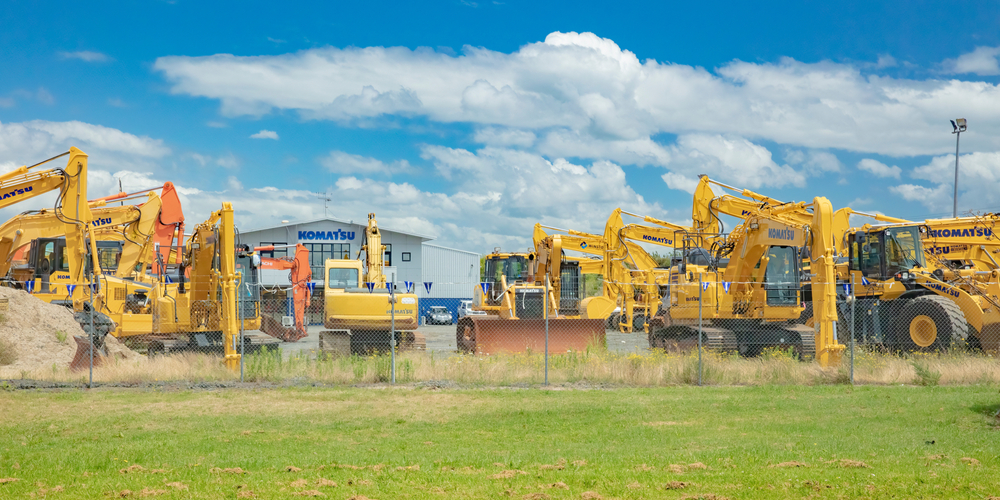Heavy machinery and equipment are pivotal for the success of construction projects, embodying a major financial commitment. The high costs associated with acquiring this essential machinery prompt construction firms to seek heavy equipment financing solutions.
These financial strategies allow companies to distribute the expense over a period, making the acquisition of necessary equipment feasible and financially sustainable. Heavy equipment financing stands as a crucial tool for firms aiming to maintain operational efficiency while managing the significant investment required for their machinery needs.
Heavy Machinery Financing: Leasing vs. Buying Insights
Heavy equipment financing encompasses a suite of financial products meticulously crafted to meet the acquisition needs of large construction machinery and vehicles. This specialized financing is vital for construction companies, enabling them to either purchase or lease necessary equipment without the burden of immediate full payment.
Leasing vs. Buying: Weighing the Pros and Cons
The choice between leasing and buying heavy machinery is more than a financial decision; it’s a strategic move that influences a firm’s liquidity, tax implications, and equipment modernity.
Leasing stands out for its lower upfront costs and flexible terms, presenting an attractive option for firms prioritizing the use of cutting-edge technology without the long-term commitment of ownership. This option is particularly appealing for equipment that rapidly becomes obsolete or is only needed for specific projects.
On the other hand, purchasing equipment outright can be a wise investment for machinery with a long lifespan and stable technology, offering long-term savings and the benefit of asset ownership.
Key Criteria and Prerequisites for Financing Approval
When evaluating applications for heavy equipment financing, lenders delve into several critical areas to determine eligibility and terms. A robust business plan showcases the strategic use of the equipment and its expected contribution to the company’s growth, serving as a cornerstone for approval.
Additionally, a strong credit history and a solid financial standing are indispensable, as they reflect the firm’s ability to fulfill its repayment obligations. Understanding these prerequisites can streamline the financing process, enhancing a firm’s chances of securing favorable terms.
Comprehensive Financing Solutions for Construction Firms
Construction companies require substantial capital investment for heavy equipment to stay competitive and efficient. Understanding the breadth of financing options can help these firms navigate their choices better, ensuring they select the best method for their specific needs.
1. Delving into Traditional Bank Loans
Banks remain a primary source for equipment financing, offering tailored loans that consider a firm’s creditworthiness and the equipment’s value. These loans can have competitive interest rates, but they often come with rigorous requirements, including substantial down payments and comprehensive financial documentation.
The terms are usually fixed, offering predictability in repayments, but necessitating a thorough financial health check of the business. For construction firms with strong credit histories and solid financial foundations, bank loans can offer a stable financing route.
2. Equipment Financing Agreements (EFAs) Explained
EFAs offer a more flexible approach to financing, directly correlating with the equipment’s lifespan and depreciation rate. These agreements are particularly tailored for the construction industry, acknowledging the heavy wear and potential for rapid obsolescence of the equipment.
EFAs can provide lower monthly payments compared to traditional loans and often include options for purchase at the agreement’s end. This flexibility makes EFAs an attractive choice for firms looking to balance their cash flow with the need for modern equipment.
3. Leasing Options from Specialized Companies
Leasing companies offer two primary types of leases: operating and finance. Operating leases work well for short-term needs, providing firms the ability to use equipment without the responsibilities of ownership, such as maintenance and depreciation.
Finance leases, conversely, are structured more like a loan, with the intent for the lessee to own the equipment at the lease’s conclusion. These options afford firms the flexibility to choose based on their immediate and future needs, budget constraints, and equipment usage patterns.
4. Government and Manufacturer Financing Programs
Certain government programs and manufacturers offer specialized financing solutions, including loans with favorable terms or guarantees that can ease the financial burden on small and medium-sized enterprises.
Manufacturer financing can be particularly advantageous, offering competitive rates and terms that are not typically available through traditional financing channels. These options can be especially beneficial for firms looking to purchase brand new equipment directly from the manufacturer.
Ensuring Favorable Financing Terms
Securing financing is a significant step toward acquiring necessary equipment, but managing the costs associated with financing is equally important.
The Art of Negotiation
Approaching negotiations with lenders or leasing companies armed with research and a clear understanding of market rates can lead to more favorable terms. This might include lower interest rates, reduced down payments, or more lenient repayment schedules, significantly impacting the firm’s financial health.
Down Payments and Interest Rates
Opting for larger down payments can decrease the loan amount and, consequently, the interest paid over time. Firms should balance the initial cash outlay with the long-term savings in interest costs, considering their current cash flow and financial stability.
Shopping Around for the Best Offers
By comparing financing offers from multiple sources, construction firms can leverage the competitive market to find the most advantageous terms. This comparison should look beyond the interest rates to include fees, repayment options, and flexibility in terms of early repayment penalties.
The Impact of Credit Scores
A strong credit score is crucial in securing favorable financing terms. Regularly monitoring and taking steps to improve the credit score, such as paying down existing debt and making timely payments, can open up better financing opportunities.
Conclusion
Choosing the right financing option for heavy machinery is a critical decision for construction firms, impacting their operational capabilities and financial health. By thoroughly exploring all available options, negotiating the best possible terms, and managing financing costs effectively, companies can ensure they make informed, strategic decisions.
Consulting with financial advisors can provide personalized insights, tailoring financing strategies to meet the firm’s unique needs and goals. As the construction industry evolves, the ability to adapt through strategic financing will be a cornerstone of success, driving growth and ensuring long-term profitability.









